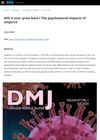 1 citations,
October 2022 in “Cureus”
1 citations,
October 2022 in “Cureus” Patients with chronic skin disorders often experience depression, anxiety, and reduced quality of life and may benefit from psychiatric help.
 May 2023 in “Dermatology online journal”
May 2023 in “Dermatology online journal” Kids with vitiligo, psoriasis, or alopecia areata are more likely to experience anxiety, depression, and social challenges.
January 2021 in “Brazilian Journal of Development” Female hair loss causes emotional distress and needs holistic treatment.
 3 citations,
March 2010 in “Acta Médica Portuguesa”
3 citations,
March 2010 in “Acta Médica Portuguesa” Polycystic ovary syndrome (PCOS) significantly impacts women's emotional well-being and social lives, requiring treatments that include psychological support.
 January 2024 in “JEADV clinical practice”
January 2024 in “JEADV clinical practice” Gender-affirming dermatology treatments generally improve mental well-being for transgender individuals, but more research is needed.
 January 2021 in “Dalhousie Medical Journal”
January 2021 in “Dalhousie Medical Journal” Alopecia, a hair loss issue, needs both medical and psychological treatments due to the limited effectiveness of drugs alone.
December 2021 in “BMJ Open” Androgenetic alopecia in men aged 46 is not significantly linked to depression, anxiety, quality of life, self-esteem, or sexual symptoms.
8 citations,
September 2013 in “Journal of Social Service Research” Lupus causes emotional and social challenges, but support from friends helps reduce depression and anxiety.
 162 citations,
August 2004 in “Journal of Investigative Dermatology”
162 citations,
August 2004 in “Journal of Investigative Dermatology” Hair loss causes stress and affects mental health; treatment and support needed.
 24 citations,
May 2015 in “Schizophrenia Research”
24 citations,
May 2015 in “Schizophrenia Research” A drug improved schizophrenia-like symptoms in stressed rats by changing brain steroid levels.
2 citations,
February 2015 in “Postępy Nauk Medycznych”  30 citations,
September 2020 in “Journal of Patient-Reported Outcomes”
30 citations,
September 2020 in “Journal of Patient-Reported Outcomes” Alopecia Areata (AA) causes significant emotional distress, including feelings of embarrassment, depression, and anxiety, and impacts social interactions and daily activities.
 2 citations,
July 1998 in “Dermatologic Clinics”
2 citations,
July 1998 in “Dermatologic Clinics” European dermatologic treatments focus on lifestyle and psychosocial factors, use diverse methods like baths and climate therapy, and emphasize the importance of diet and supplements for skin health.
August 2021 in “Journal of the American Academy of Dermatology” The study evaluated how alopecia areata severity relates to its psychosocial effects on patients.
 October 2008 in “The Journal of Urology”
October 2008 in “The Journal of Urology” Finasteride reduces prostate cancer risk but may increase high-grade tumors and has side effects; biopsy methods have similar outcomes; psychosocial factors affect sexual recovery post-surgery.
 68 citations,
February 1990 in “Journal of Applied Social Psychology”
68 citations,
February 1990 in “Journal of Applied Social Psychology” Bald men are often viewed more negatively and as older than they really are.
52 citations,
October 1997 in “American Journal of Psychiatry” Trichotillomania is a complex condition involving compulsive hair pulling that causes distress and hair loss.
 48 citations,
September 2013 in “Oncologist”
48 citations,
September 2013 in “Oncologist” Endocrine therapies for cancer significantly increase the risk of hair loss.
36 citations,
December 2014 in “F1000 prime reports” The document concludes that Hidradenitis suppurativa is often underdiagnosed, lacks definitive treatment, and requires better awareness and management strategies.
 16 citations,
January 2013 in “Indian Journal of Dermatology, Venereology and Leprology”
16 citations,
January 2013 in “Indian Journal of Dermatology, Venereology and Leprology” New treatments and early diagnosis methods for permanent hair loss due to scar tissue are important for managing its psychological effects.
 15 citations,
January 2018 in “Annals of Dermatology”
15 citations,
January 2018 in “Annals of Dermatology” Wigs significantly improve the well-being of people with severe hair loss.
14 citations,
March 1994 in “Archives of Dermatology” A married couple both developed alopecia areata, possibly due to shared stress.
12 citations,
January 2020 in “Indian Dermatology Online Journal” Female pattern hair loss has multiple causes and treatments, with new therapies showing promise.
 7 citations,
February 2022 in “JAAD International”
7 citations,
February 2022 in “JAAD International” COVID-19 may be linked to hair loss or worsening of hair loss in some people.
 7 citations,
August 2018 in “South African Medical Journal”
7 citations,
August 2018 in “South African Medical Journal” Clinicians should understand tattoos to manage health issues, as tattoos can cause complications and affect medical assessments.
 6 citations,
May 2022 in “Frontiers in Medicine”
6 citations,
May 2022 in “Frontiers in Medicine” The study suggests pandemic stress might worsen or trigger hair loss problems.
 5 citations,
December 2012 in “Journal of Dermatology”
5 citations,
December 2012 in “Journal of Dermatology” Wigs greatly improve life quality for hair loss patients.
 2 citations,
July 2022 in “Journal of The American Academy of Dermatology”
2 citations,
July 2022 in “Journal of The American Academy of Dermatology” People with alopecia who are more resilient tend to feel less stressed.
 2 citations,
October 2009 in “The FASEB Journal”
2 citations,
October 2009 in “The FASEB Journal” Stress does not greatly speed up aging or hair loss in politicians.



















